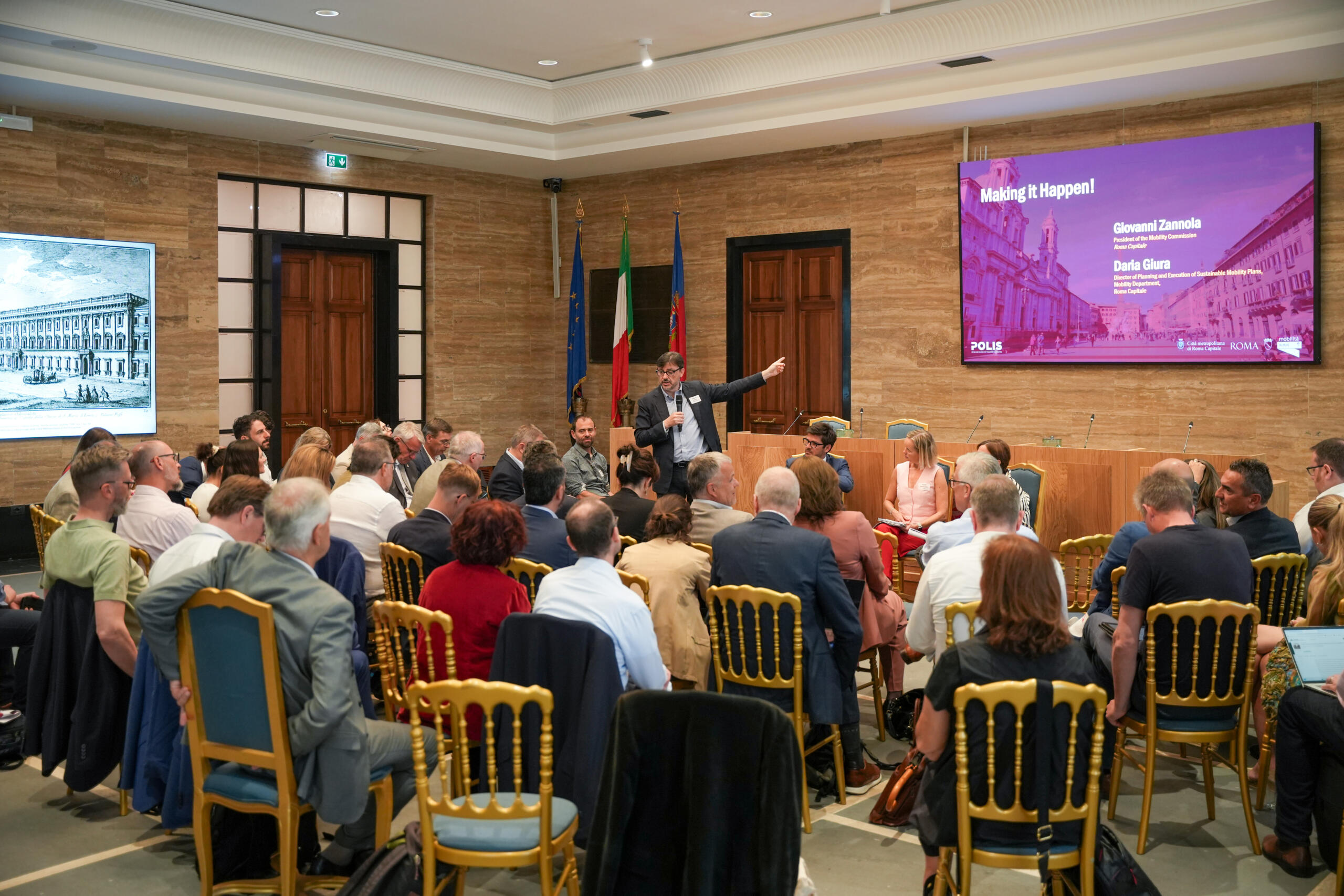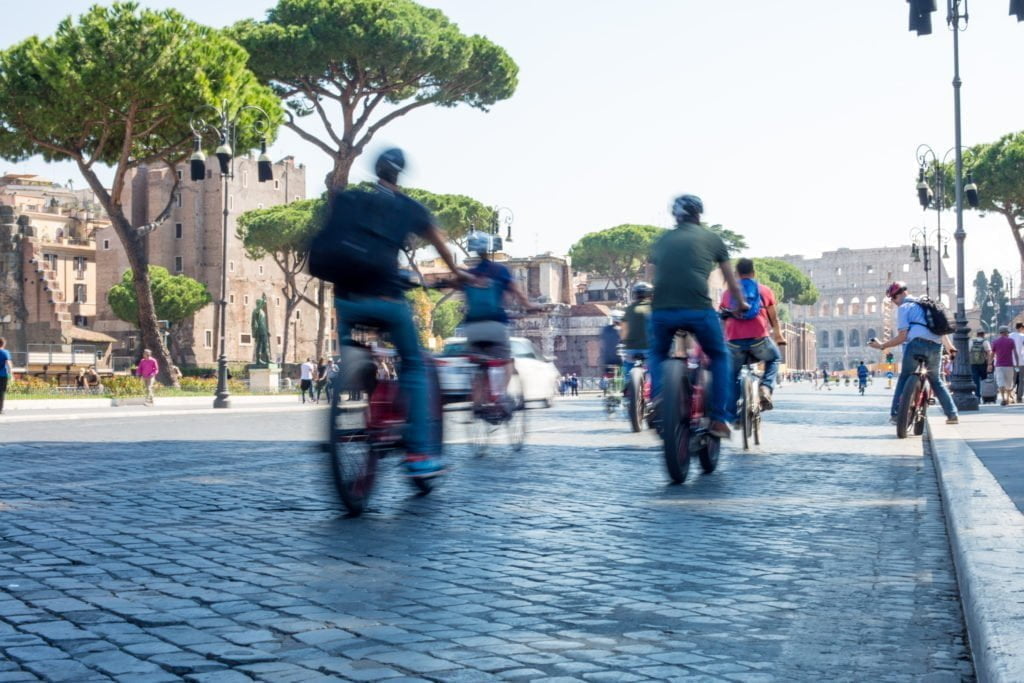Political leaders align local action with EU mobility goals at the POLIS Political Group meeting in Rome
On 15 May 2025, the POLIS Political Group convened in Rome, hosted by Roma Capitale, Roma servizi per la mobilità, and Città Metropolitana di Roma Capitale, for a high-level dialogue on the current political dilemmas shaping sustainable urban mobility.
Following a day of honest dialogue and strategic reflection during the POLIS Leadership Summit, political leaders from across the POLIS membership gathered in Rome to explore how to bridge the gap between local ambition and national and European frameworks, especially in an increasingly complex policy and funding landscape.
The meeting, held within the historic Palazzo Valentini of Rome Città Metropolitana, opened with a call to continue the momentum.
“We are in a site that represents cooperation between city and region, and that’s exactly the spirit we need, to tackle mobility challenges together,” said Eugenio Patanè, Deputy Mayor, Roma Capitale, emphasising the vital relationship between cities and their wider metropolitan area.

From left to right: Giovanni Zannola, President of the Mobility Commission, Roma Capitale / Karen Vancluysen, Secretary General, POLIS / Daria Giura, Director of Planning and Execution of Sustainable Mobility Plans, Mobility Department, Roma Capitale. Photo credit: Lavinia Blasi
Making it happen: Rome’s mobility story
Roma Capitale provided a local lens through which the day's discussions were grounded. Describing Rome as a city of many identities and layers, city representatives painted a picture of a transport system that must navigate archaeological sensitivities, entrenched car dependency, and complex multi-level governance.
“It’s not just about moving from point A to point B—it’s about doing so in a way that respects our history, serves modern life, and enables travel for users in different urban landscapes,” said Giovanni Zannola, President of the Mobility Commission, Roma Capitale.
Some of Rome’s efforts surrounding sustainable urban mobility include: the deployment of over 700 low-emission electric buses; the implementation of new taxi licences aimed at improving accessibility for people with reduced mobility; the expansion of low-emission zones, including a new limited traffic area in the Appia Antica area; and investments in digital tools and integrated ticketing through Mobility-as-a-Service (MaaS) platforms.
Reflecting on their experiences, representatives from Roma Capitale shared key lessons from their mobility journey. First and foremost, public involvement has proven essential: when citizens are engaged in the process, they are far more likely to support and adopt the outcomes. Rome’s long-term vision is not tied to a single solution but focused on building a resilient, integrated network where all mobility modes function cohesively rather than as isolated services. While significant challenges remain, Rome is confident that the foundations are in place.
“We still have much work to do, but thanks to the challenges we’ve faced and the partnerships we’ve built—such as the one with POLIS—the path is clear. Together, let’s build a mobile, human-scaled transport system for our cities,” said Giovanni Zannola, President of the Mobility Commission, Roma Capitale.
Defining and fighting transport poverty
The meeting then turned its attention to transport poverty and the Social Climate Fund (SCF), a key European tool meant to support the most vulnerable users in the climate transition. Discussions highlighted both the potential of the SCF for inclusive mobility and the current disconnect between national planning processes and local realities.
POLIS has been actively advocating for stronger local involvement, underlining that cities and regions are not only implementers but essential architects of effective solutions. Our latest policy paper, ‘Fighting Transport Poverty with the Social Climate Fund’, provides strategic recommendations on boosting public transport, shared mobility, and active travel, outlining key ways to address the structural problem of transport poverty with structural solutions.
Securing urban mobility in the EU budget
Discussions then shifted to the future of European funding, particularly within the proposed structure of the Multiannual Financial Framework (MFF). With mobility policy scattered across multiple funding streams, including national single plans and decarbonisation instruments, cities are concerned that urban transport could fall through the cracks.
Navigating collaboration with national governments
A recurring theme was the growing disconnect between local ambition and national politics. As national governments become more polarised, participants acknowledged the increasing difficulty of aligning on shared priorities and securing support for local mobility initiatives.
The discussion emphasised the importance of local authorities staying focused on their mandates and maintaining the trust of their communities, while also demonstrating to national partners the essential role cities and regions play in driving the mobility transition. Participants also stressed that local leaders should not face these challenges in isolation: collaborative platforms such as the POLIS Political Group offer vital spaces for peer learning, shared inspiration, and collective resilience.
“Stay grounded in your mandate: our citizens have placed their trust in us, and we must demonstrate to national partners that we are not just capable, but indispensable to driving this transition. And we don’t have to go it alone—meetings like this matter, they are where we learn from one another, inspire one another, and build the resilience we need to move forward together.”, said Hanneke Steen, Alderman, Twente2050/Region of Twente.
The conversation also highlighted the value of framing mobility as a driver of broader national objectives, such as housing, economic growth, and public health. By aligning transport strategies with these priorities, local authorities can strengthen their influence and impact.
What comes next?
The meeting concluded with a shared sense of urgency and responsibility. In the months ahead, POLIS will continue to advocate for stronger local authority involvement in the implementation of the Social Climate Fund, defend urban mobility funding within the evolving Multiannual Financial Framework, and push for clearer recognition of cities and regions in both national and EU-level planning processes. At the same time, the network will remain a platform for collaboration, supporting members in advancing inclusive, efficient, and future-ready transport systems.
The discussions in Rome reinforced a clear and collective message: local leaders are not standing idly by, they are confronting challenges head-on and working together to find real, lasting solutions.




